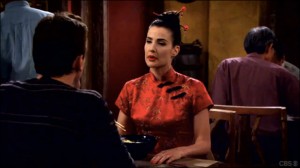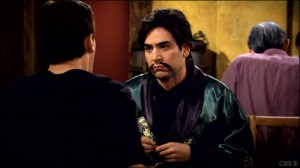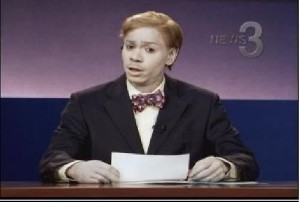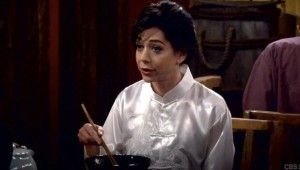The most recent episode of the CBS comedy How I Met Your Mother was panned by some fans as tasteless and racist when it depicted three of the shows protagonists what critics characterized as “Yellowface.”
People on twitter had words to say:
I used to watch @HowIMetMother but I now refuse to and hope they apologize for yellowface. #HowIMetYourRacism
— Suey Park (@suey_park) January 15, 2014
@CBS #Yellowface doesn’t get you better ratings, it just makes people want to boycott your network #HowIMetYourRacism
— JH Seouljaboy Park (@SeouljaboyPark) January 15, 2014
Really, #HIMYM?? You couldn’t even bring yourself to hire Asian actors for this? http://t.co/oUdTXneCe6 #HowIMetYourRacism @CBS — šīrīn ✺ šəfīʿ (@shereenTshafi) January 15, 2014
(Tweets from Buzzfeed’s article)
I don’t think it deserved all the vitriol. First of all, let me first say that as a person of color (half-Asian), I cannot be racist. It’s a fact. Now that that’s done, let me lay out a few reasons why I think the critiques of HIMYM are a little too venomous.
Context is everything
One of the reasons that blackface/yellowface is an important issue is practical — having white actors portray Asians is a way to disenfranchise these performers in the media. Time writer Kai Ma said this precisely:
“What has always been so disturbing about yellowface, blackface, brownface, and redface, is how far the industry is willing to go to not employ people of color. Instead of hiring an Asian-American actor to portray an experience written by an Asian American writer — an experience that can certainly include a penchant for kung fu — television has historically, aggressively, employed white artists to write about and portray non-white people.”
Which is true, and if you didn’t watch the episode, is a totally reasonable claim to make. But the whole conceit of the slap training montage in question was that it was made up. The roles were played by the show’s protagonists because they were supposed to be the show’s protagonists, and they carried their personalities and in-show stories with them. The actual Asian people in the episode (and there were a number) all acquitted themselves perfectly well.
What is yellowface here?
So we’ve established that the roles the “yellowface” characters were playing weren’t those of Asian people. But what exactly did they do that got people so fired up?

Okay, well this is a bit easier. Her face isn’t yellow, but she’s got those chopstick things AND a kimono.

FU MANCHU! I FOUND IT. EXTRA CRISPY RACISM! What…who is Fu Manchu? Oh wait, you didn’t grow up watching Boris Karloff’s performance in The Mask of Fu Manchu? Oh well, you know it’s this funny beard thing that means something.
Oppression is about power and history — yellowface is not blackface
 When Dave Chappelle puts on whiteface (real, actual whiteface) and makes fun of white stereotypes, we laugh. A black person can call a white person a “honky” or “cracker”, it is comedic rather than offensive. And yet I cannot even mention the slur a white person would use.
When Dave Chappelle puts on whiteface (real, actual whiteface) and makes fun of white stereotypes, we laugh. A black person can call a white person a “honky” or “cracker”, it is comedic rather than offensive. And yet I cannot even mention the slur a white person would use.
I am not a culture warrior upset about this. I accept that this is the way the world works.
I am try to critically examine the claim that one cannot portray people of other races on film. The common cultural consensus seems to be that one can, as long as it is directed towards privileged people. Can we say that Asian-Americans today speak from the same place of oppression as black Americans or Latinos do? Is it a relative thing? Could a black person do yellowface? Could a Native American? The knots of power and race get very tangled here and make this a complex issue.
Being focused only on racial performance is distracting
If this episode had been tweaked to include Asian actors instead of white ones, I doubt that we’d be hearing flame wars about it. At least it wouldn’t have a catchy #yellowface hashtag. I think that’s a problem. We should be angry about performances that exacerbate racial stereotypes, but by focusing solely on Ted’s Fu Manchu mustache we run the risk of failing to observe racism in its many, many forms.
In the end, I’m inclined to excuse lazy wardrobe choices and give the show’s creator Carter Bay the benefit of the doubt:
With Monday’s episode, we set out to make a silly and unabashedly immature homage to Kung Fu movies, a genre we’ve always loved.
— Carter Bays (@CarterBays) January 15, 2014
So everybody calm down. Let’s back down to yellow alert.


















































A) Why is it ALWAYS the Han Gook-Americans (this is THEIR language…not being racist) that always get their panties twisted in a ball first??? Are they some sort of self appointed American “offended by everything” police? Hell…I get offended when I see Koreans portraying Japanese or Chinese in movies/TV shows!
B) Those are not “kimonos” being worn by the female actors.
C) “Fu Manchu” ‘staches are the norm for Asians because their facial hair generally ends up stringy and wise sage-like. Like the “lucky” hair that grows out of their moles.
D) “let me first say that as a person of color (half-Asian), I cannot be racist. It’s a fact.” Tongue planted firmly in cheek, no doubt…
Cheers.
“I cannot be racist. It’s a fact.”
If you are prejudiced FOR or AGAINST anyone because of their race, it’s racist.
If the prejudice you have for or against that person is because you are convinced they are an idiot, regardless of their skin color, then it’s not racist.
Sorry, there was some html missing from my original article.
[sarcasm] First of all, let me first say that as a person of color (half-Asian), I cannot be racist. It’s a fact. [/sarcasm]
There is no buzz at all here, nothing special to dig up…
The whole serie is full of stereotypes, about so many different kind of people. Actually, the writers bash white people so much more than they bash asians or blacks. So what’s next? “Blond and stupid bitches” making a buzz because of Barney’s attitude towards them in the show? Or “architecture teachers” signing a petition because of Ted acting a lame dude?
This is typically what any foreigner starting to make chinese friends needs to know : many of them simply can’t laugh about themselves, and you can’t say anything without having them taking it first degree and making a huge scene about it. Hope time will make ‘em change someday.
I for one am shocked and dismayed that a network television sitcom has failed to do something well.
How he met who?
You clearly have no understanding of the issues here. There is so much wrong with this article, I don’t even know where to start.
“So we’ve established that the roles the “yellowface” characters were playing weren’t those of Asian people. ”
No, you didn’t establish this. They were playing Sinosized versions of themselves, which is to Yellowface themselves.
“A black person can call a white person a “honky” or “cracker”, it is comedic rather than offensive. ”
No, we (white people) don’t find it comedic and do find it offensive. Oh, sorry, as a white person I don’t speak for all white people and every white experience. So *I* do find it offensive.
“I am not a culture warrior upset about this. I accept that this is the way the world works.”
*You* do not get to speak for every Asian (or half-Asian) or every Asian experience. Just because *you* are not offended does not mean it is automatically not offensive. You do not get the right to dismiss someone else’s feelings just because you don’t share them. What you have exemplified here is a textbook definition of oppression.
“I am try to critically examine the claim that one cannot portray people of other races on film.”
No, you aren’t.
“The common cultural consensus seems to be that one can, as long as it is directed towards privileged people.” No, they cannot.
“Can we say that Asian-Americans today speak from the same place of oppression as black Americans or Latinos do?”
No, they do not.
“Is it a relative thing?”
No, it is not.
“Could a black person do yellowface?”
No.
“Could a Native American?”
No.
“The knots of power and race get very tangled here and make this a complex issue.”
No, race is not a complex issue.
“If this episode had been tweaked to include Asian actors instead of white ones, I doubt that we’d be hearing flame wars about it.”
Duh.
“I think that’s a problem.”
Calling out racism is not the problem. Racism is the problem.
“We should be angry about performances that exacerbate racial stereotypes.”
I’m not sure who the “we” is here, but writers in the AAPI community and others who actually care about this issues no matter their race *do* get angry about this problem as well. We can be angry about more than one thing or more than one aspect of a thing at the same time. As I said earlier, you just obviously have spent no time educating yourself about this topic.
“but by focusing solely on Ted’s Fu Manchu mustache we run the risk of failing to observe racism in its many, many forms.”
Believe me, no one is failing to observe racism in it’s many forms, especially activists like Suey Park who you so flippantly dismiss in this article.